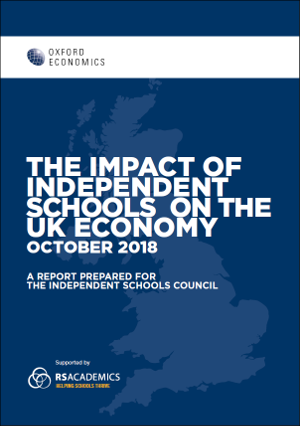Ungated Post | 03 Oct 2018
The impact of independent schools on the UK economy

Independent schools support £13.7 billion of UK GDP annually, associated with over 300,000 jobs and £4.1 billion of yearly tax revenues. They help the exchequer further by providing an alternative to state-funded education, and boost the economy’s long-term productive potential by improving educational outcomes.
In total, around 620,000 school pupils – some six percent of the national total – attend independent as opposed to state schools in the UK. Taking into account associated ‘indirect’ (supply chain) and ‘induced’ (wage-funded spending) impacts, these schools’ activities support £13.7 billion of GDP, 300,000 jobs, and £4.1 billion of taxation, via their impact on demand. The also save the UK taxpayer £3.5 billion per annum, as 530,000 of these pupils would otherwise be eligible for a state-funded school place. The schools also make a positive contribution to the economy’s supply-side.
As the sector’s educational outcomes are above-average, we estimate that they could boost the UK’s long-term growth rate by around 0.07% per annum, taking into account OECD research. As this growth shortfall is compounded year-on-year, the impact on annual GDP could be quite marked after several decades.
Our economic consulting team are world leaders in quantitative economic analysis, working with clients around the globe and across sectors to build models, forecast markets and evaluate interventions using state-of-the art techniques. Lead consultants on this project were:
Oxford Economics’ team is expert at applying advanced economictools that provide valuable insights into today’s most pressing business, financial,and policy issues.
To find out more about our capabilities, contact:
EMEA
Sam Moore
+44 (0)207 803 1415
Email
Americas
Hamilton Galloway
+1 (646) 503 3068
Email
Asia
Peter Suomi
+65 6829 7198
Email
Related Services

Post
The economic impact of abandoning the WTO
Oxford Economics have been commissioned by the International Chamber of Commerce (ICC) to provide an independent assessment of the economic impact of WTO dissolution. This report details our findings and the assumptions underpinning our analysis.
Find Out More
Post
The economic impact of the sports activities of public service media
This study shows how the sports activities of public service media supported €4.5 billion of GDP and 57,000 jobs across 31 European countries in 2022, taking direct, indirect (supply chain), and induced (wage-funded expenditure) impacts into account. The report also highlights wider economic benefits of public service media sports coverage, such as the way in which it leverages sponsorship income for sports bodies.
Find Out More
Post
Global Trade Education: The role of private philanthropy
Global trade can amplify economic development and poverty alleviation. Capable leaders are required to put in place enabling conditions for trade, but currently these skills are underprovided in developing countries. For philanthropists, investing in trade leadership talent through graduate-level scholarships is an opportunity to make meaningful contributions that can multiply and sustain global economic development.
Find Out More